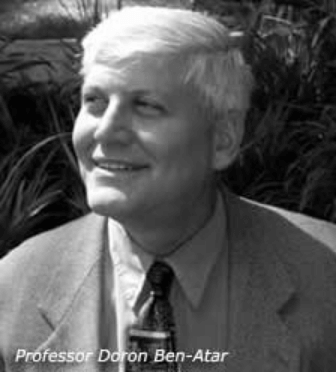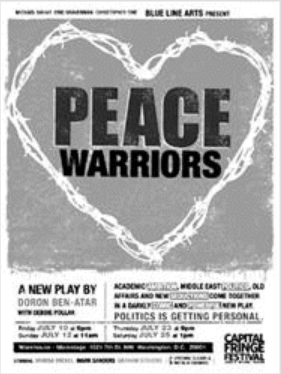New play addresses demonization of Israel among intellectual elite

NEW HAVEN — Professor Doron Ben-Atar’s play, “Peace Warriors,” which he co-wrote with Debbie Pollak, will be performed at the Capital Fringe Festival in Washington, D.C. in July and at the New York International Fringe Festival in August. The play was a semi-finalist in this year’s O’Neill theater competition.
A resident of New Haven, where he is active in the Jewish community, Ben-Atar is the chair of the history department at Fordham University, as well as a member of the university’s Middle East studies and women’s studies programs. He is also a fellow of the Yale Initiative for the Interdisciplinary Study of Antisemitism at Yale University and was a fellow at the Dorothy and Lewis B. Cullman Center for Scholars and Writers at the New York Public Library.
Ben-Atar’s first play, “Behave Yourself Quietly,” is based on his mother’s experience at Auschwitz. He and his mother, Roma Nutkiewicz Ben-Atar, had previously collaborated on a book, “What Time and Sadness Spared: Mother and Son Confront the Holocaust” (University of Virginia Press, 2006).
Ben-Atar is the author of numerous books and articles on American history, the modern Middle East and psychohistory’ including “Trade Secrets: Intellectual Piracy and the Origins of American Industrial Power.” A frequent commentator on the modern Middle East on many radio and television programs, he has written about current international affairs in “The Chronicle of Higher Education,” the “Jerusalem Report” and “The Globalist.”
Raised in Israel, where he played basketball for Maccabi Tel Aviv, Ben-Atar came to the U.S. to study and play basketball at Brandeis University. He has coached soccer and basketball at Ezra Academy in Woodbridge, and chaired Talmud Torah Meyuchad of the New Haven Department of Jewish Education. He serves on the Anti-DefamationLeague’s civil rights committee and is a founding member of the board of the new Jewish High School of Connecticut.
The Ledger spoke with Ben-Atar as he was preparing to leave for the nation’s capital for the premiere of “Peace Warriors.”

Q: What is “Peace Warriors” about?
A: “Peace Warriors” is a dramatic exploration of the fashion of taking anti-Israel positions among the American intellectual elite. A visit from an old family friend sparks rivalries and hidden affairs, as four academics and one teenage girl flaunt their peace activism. Family conflicts spin out of control, while the characters argue war and peace in the Middle East, and in the bedroom.
Q: You are an Israeli American and a professor of American history. What inspired you to write this play?
A: I wrote “Peace Warriors” because we are living through a worrisome dramatic rise in global antisemitism. Leading the charge is the intellectual elite who are demonizing Israel and de-legitimizing its existence. College classes on the history and politics of the Middle East teach students that Israel is the new Nazi state, and that terrorism against Jewish targets in Israel and around the globe is a justifiable anti-colonial act of resistance. Jewish students and professors who dare to question these positions face an intimidating and corrosive hostile atmosphere. Israeli academics are subject to boycotts and harassment. And the movement to divest university endowments from companies that do business with Israel is rapidly gaining strength.
The actual event which inspired the play sounds made up, but it is sadly true. My family and I live in New Haven and are active members of the Jewish community. We got a call a few years ago from our friend, the Yale Hillel director, telling us that a troupe of co-existence actresses were coming to perform at Yale; he asked us if they could stay at our place. The group was supposed to consist of an Israeli Jew and a Palestinian – co-existence activists – a driver, and a tech person. We found out that the Palestinian wasn’t really a Palestinian but an Israeli Arab who lived inside of Israel, and the Arab refused to stay at our house because she hated the Israeli activist and could not bear to be in the same house with her!
Various organizations and individuals invest a great deal of money and energy in co-existence. But all too often taking part in these projects involve Jewish self-abnegation. My camp, the peace camp in Israel, has been devastated electorally in recent contests because its activities are characterized by denial of Israel’s claim — we lost our credibility with our own public because we seem to see only the other side. I haven’t altered my convictions. I hate the occupation and believe it has had a brutalizing effect on Arabs and Jews. I never supported the settlement policy, but the conversation about this subject is reduced to a vile shrill. Settlers are the most demonized group in the world. Not to acknowledge their humanity and the life they live — that they live under constant threat — is not fair. Many in the peace camp don’t actually know a single settler. They know more Palestinians. But they imagine settlers as beastly violent fascist fanatics.
Q: Why do you write plays?
A: I am a historian by trade. Playwriting allows me to take part in age-oldJewish conversations. In drama I explore the three major Jewish questions of our time: the memory and persecution of the Holocaust, the place of Israel in contemporary Jewish life, and Jewish continuity. My first play, “Behave Yourself Quietly” considers the meaning of the memory of the Holocaust. “Peace Warriors” explores how Zionism and Israel have become such demonized entities. My next play is set at an old age home and looks at the question of “who are the real children?”
Q: The press materials for the play report, “All the inflammatory statements about Israel that are uttered in the play are actual quotes of statements uttered by the leading anti-Israel crusaders of our time. However, some anti-Israel statements by prominent intellectuals were so harsh that readers said they would not be believable on stage.” Can you explain?
A: It is true. Some of the real quotes that have been said were deemed so offensive by earlier readers of the script that they urged me to tone them down because they would not be believable on stage! My play examines the celebrated anti-Zionist Jew – those who claim to be better than the rest of us because they make a career out of uttering hateful, demonizing remarks against Israel. I’ll give you an example. In the original script, I copied a real petition and wrote, “The students… oppose the existence of the apartheid colonial settler state of Israel, as it is based on the racist ideology of Zionism and is an expression of colonialism and imperialism. We unconditionally support Palestinians’ human right to resist occupation and oppression by any means necessary in all the territory of historic Palestine.” The revised text now reads, “We… oppose the apartheid policies of the rogue state of Israel and reject the racist ideology of Zionism that led to the dispossession of millions. We sympathize with the plight of the Palestinians. . .”
Q: How did you go about getting your play produced?
A: The process of getting a play to the stage is as follows. You send it around to different places that you find in the Dramatists’ Sourcebook. Most places get hundreds of scripts and they really don’t have the time or resources to give the scripts a fair look. It is very rare for a theater company to take a risk and produce a new play by someone who is not well-established. I was fortunate. I sent “Peace Warriors” to Blue Line Arts, Inc., a group run by three brilliant men, that does festivals, like the well-known Edinburgh Festival, and they liked it and decided to stage it in American festivals this summer.
Q: Your first play incorporated laughter into a story about genocide. Does “Peace Warriors” involve similar in-your-face humor?
A: Absolutely. I am an iconoclast and the play is a comedy. I think laughter allows us to deal with complex issues in greater depth. That is what I tried to do in “Behave Yourself Quietly,” and this is what I hope to achieve with “Peace Warriors.”
Howard Blas is a freelance writer from New Haven.
